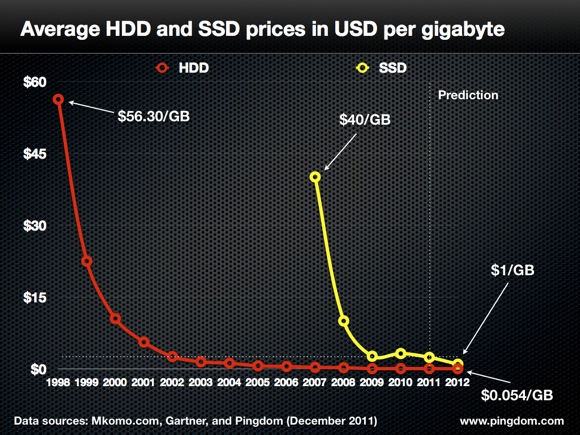SSD Prices Falling Faster Than HDD Prices
Pingdom has posted a chart comparing the price decline of hard disk drives (HDDs) and solid state disk drives (SSDs).
While SSDs remain considerably more expensive than hard drives on a per GB level, the flash-based storage devices are coming down in prices much faster than HDDs have.
According to the data released, SSD memory cost 120 times as much as HDD memory in 2007, but only 32 times as much in 2011. The average price for a HDD per GB was $0.075 in 2011, the SSD cost $2.42 per GB. The lowest per GB price for a SSD was $1.50, while HDD could be purchased for $0.053 per GB. According to Pingdom, the 2011 average price per GB for the SSD is about the same as it was for HDD in 2002. SSDs are expected to be priced at about $1 per GB sometime in the second half of next year.
Despite the rapid price decline, it is unlikely that SSDs will be matching the price level of hard drives anytime soon unless hard drive technology will hit a substantial physical barrier. That barrier has been pushed out continuously for as long as modern hard drive has existed. The most recent increase in capacities has been driven by perpendicular magnetic recording technology and it appears that heat-assisted magnetic recording could surface in 2013 or 2014 to push the limits even further. Seagate, for example, believes that heat assisted recording will increase the maximum storage density of perpendicular magnetic recording by at least 50x.
Get Tom's Hardware's best news and in-depth reviews, straight to your inbox.

Douglas Perry was a freelance writer for Tom's Hardware covering semiconductors, storage technology, quantum computing, and processor power delivery. He has authored several books and is currently an editor for The Oregonian/OregonLive.
-
amdfangirl Now all we need is better Btfs support on Linux for the mass proliferation of SSDs.Reply -
dickcheney gavenrgood to see. I would rather spend money on processor's and videocards.Reply
The gains in Windows general snappiness are worth it. I never looked back and never would. -
CaedenV What amazes me is just how quickly they chew through the bandwidth standards. When they first came out remember they were no faster (and often slower) than a HDD. The idea was that they were going to be for low power devices that required very little space. Within months they saturated the SATA standard, and within 2 years they saturated SATA2. When SATA3 came out it just took 2-3 months to saturate that as well, and we know that is where the bottleneck is because there are already drives that max (or close to max) out the PCIe2 x4 standard!Reply
When I first started video editing 'way back' in 98 RAID was required to sustain the ~40MB/s required for 2 video streams, and you needed those 2 drives in at least RAID0 to have enough space. ~2002 you could do the same thing on a single drive, and have one large enough to store a project on a single drive. Things progressed rapidly until 1TB drives came out, which could sustain a good 60-80MB/s. But the build has been rather slow after that, and now most HDDs can only push a sustained 120-140MB/s, compared to the 550MB/s of an SSD. Seek times on HDDs have always hovered around 8ms, and have never really improved, while the SSDs are 0ms. It really is mind blowing to look back at. -
snotling amdfangirlNow all we need is better Btfs support on Linux for the mass proliferation of SSDs.Yeah because we all know that the masses use linux everyday...Reply -
house70 I think they should convert HDD plants to SSD plants. That will make SSD even more widespread and more affordable.Reply -
memadmax Any articles about the "heat assisted recording"?Reply
I'm very interested in this and as yet can't find anything.
